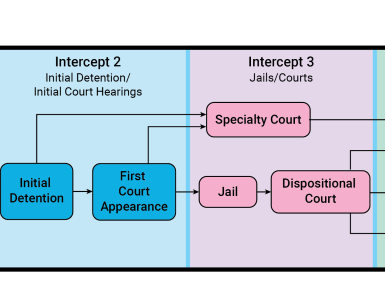Familiar Faces Initiative
Improving Outcomes Through Coordinated Heath & Justice Systems

Sections
Familiar faces - individuals with complex behavioral health needs who frequently cycle through jails, homeless shelters, emergency departments and other local crisis services - often do not have the support needed to ensure treatment engagement and successful outcomes. Counties and cities’ complex social services systems can be fragmented, leaving vulnerable individuals to fall through the cracks. The Familiar Faces Initiative empowered communities to share data and integrate care options between health and justice systems. While this program concluded in 2024, counties continue to pursue early intervention, improved outcomes and reduced incarceration and hospitalization rates for community members.
Resources
Familiar Faces Initiative Case Study: Orange County, Calif.
Orange County is a Familiar Faces Initiative (FFI) Peer-Learning Site modeling effective cross-sector data sharing and familiar faces programming for the FFI community.
Familiar Faces Initiative Case Study: Johnson County, Kan.
Johnson County is a Familiar Faces Initiative Peer-Learning Site that models effective cross-sector data sharing and familiar faces programming to divert residents with behavioral health conditions from jail to treatment.

Data-Driven Justice: A Playbook for Developing a System of Diversion for Frequent Utilizers
The Playbook is designed to help guide the development of a multi-system strategy to successfully divert frequent utilizers, when appropriate, away from the criminal justice and emergency health systems and toward community-based treatment and services.

Point-of-Service Information Sharing Between Criminal Justice and Behavioral Health Partners: Addressing Common Misconceptions
Information sharing across behavioral health and criminal justice systems is critical to reducing the number of people with mental and substance use disorders in jails.

Team Planning for Data-Driven Justice
This workbook – including team exercises, worksheets and action plan template – is designed to guide communities through the development of their strategies to share data across systems.
Past Events

Familiar Faces Initiative: Model Jurisdictions for Improving Outcomes through Coordinated Health and Justice Systems
Join NACo to celebrate the one-year anniversary of the Familiar Faces Initiative, participate in discussions with each of the Peer Learning Sites and learn about state and county collaboration to better support familiar faces in local communities.

County Strategies to Provide Supportive Housing for Familiar Faces
Join NACo for a panel discussion with experts and county leaders who have developed innovative funding models to support housing programs and facilities for familiar faces within their communities.

County Strategies to Recruit and Retain a Strong Behavioral Health Workforce
Join NACo for a panel discussion of innovative solutions to behavioral health workforce challenges.

Using Public Safety Funds to Support Community Members’ Behavioral Health
From mental health clinicians to peer navigators, sheriffs and police chiefs across the country are investing funds from their own budgets in the behavioral health workforce to provide the treatment and services to people in need before they come into contact with law enforcement or jails.

Somewhere to Go During a Behavioral Health Emergency: Crisis Triage Centers and Behavioral Health Clinics
Counties are partnering with health care providers to establish crisis triage centers that offer in-person treatment and services to people experiencing a behavioral health emergency.

911 Dispatch: Innovations for Addressing Behavioral Health Crisis Calls
This webinar will feature a presentation on The Pew Charitable Trust’s recent research on 911 call centers’ capabilities to handle behavioral health crises and highlight localities that have developed innovations in 911 dispatch centers.

Non-Law Enforcement Responses to People Experiencing a Mental Health Crisis
Counties and cities across the country are looking for innovative ways to respond to 911 calls for service involving people experiencing a mental health crisis.

Data-Driven Justice: A Playbook for Developing a System of Diversion for Frequent Utilizers
The Playbook is designed to help guide the development of a multi-system strategy to successfully divert frequent utilizers, when appropriate, away from the criminal justice and emergency health systems and toward community-based treatment and services.

Coordinating a System Response to 911 Dispatch
Join NACo, in collaboration with our Stepping Up partners and Data Driven Justice network for a discussion on 911 dispatch intervention strategies with a special emphasis on data collection, screening and practical local approaches to resolving 911 calls safely without unnecessary justice system involvement.
DDJ Virtual Panel Discussion: Lessons Learned from Pilot Projects
Join Data-Driven Justice (DDJ) for an engaging virtual panel discussion on the outcomes of the two-year DDJ pilot program with three communities: Johnson County, Iowa; Long Beach, Calif. and Middlesex County, Mass.

Data-Driven Justice National Listening Session: COVID-19 Impacts and Innovations Across Justice and Behavioral Health Systems
Please join Data-Driven Justice on Friday, May 22 at 2 p.m. EDT for a discussion on national and federal justice and behavioral health resources as communities continue to navigate the COVID-19 pandemic.

Stepping Up and Data-Driven Justice: Using Data to Identify and Serve People who Frequently Utilize Health, Human Services and Justice Systems
Counties across the country have committed to creating data-driven, systems-level plans to reduce the number of people with mental illnesses in their jails.

Stepping Up and Data-Driven Justice: Using and Sharing Data Across Health, Human Services and Justice Systems to Improve Responses for People Who Have Mental Illnesses
Counties across the country are building collaborative partnerships to reduce the number of people with mental illnesses in their jails.
Related News

Information-sharing bill could protect court workers
The Countering Threats and Attacks on Our Judges Act could provide more than 30,000 state and local judges with access to security assessments, best practices and a database of threats made against colleagues in the justice field.

California counties fight agricultural crime
Sheriffs' offices and prosecutors in California's central valley make specific efforts to prevent and prosecute crimes against the agricultural community.
Survivor’s story helps empower Ohio county dog wardens
A courageous dog attack survivor helped county dog wardens make their case for more authority to protect residents.

After historic winter storms, counties assess response
Counties in states that rarely receive much winter weather are assessing their responses to the January storm that left many covered in snow and ice.

DHS funding set to lapse, putting key county partners at risk of a partial shutdown
The U.S. Department of Homeland Security (DHS) is headed toward a funding lapse at 12:01 a.m. ET on Feb. 14 after the Senate failed this week to advance legislation to fund DHS for the remainder of Fiscal year (FY) 2026.

SBA issues new rule affecting local permitting in post-disaster rebuilding
The U.S. Small Business Administration (SBA) has issued an interim final rule that changes how rebuilding projects financed with SBA disaster loans following a Presidentially declared disaster interact with state and local permitting requirements.